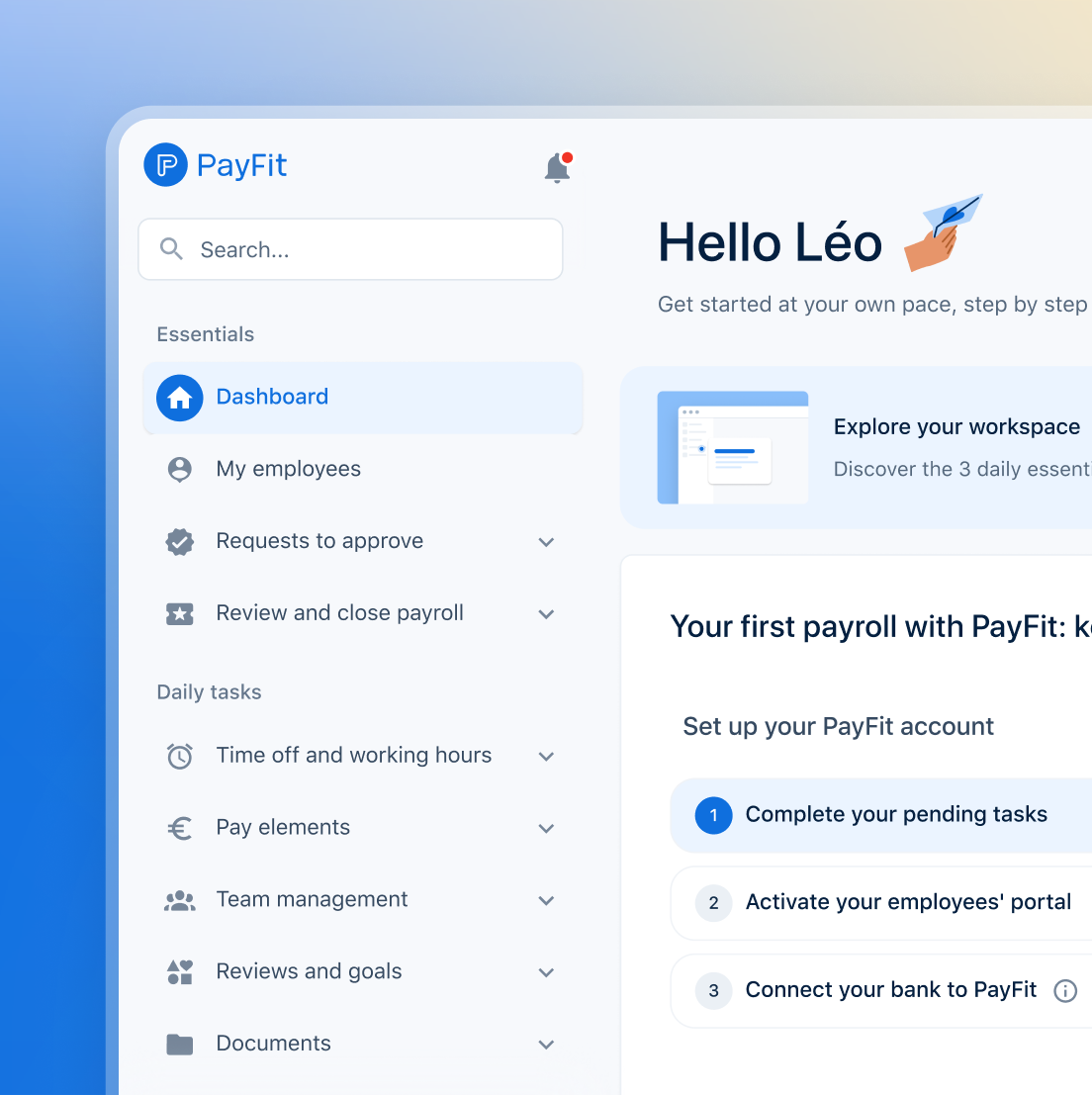✨ Health insurance, now in PayFit - learn more
💷 All the rates & thresholds you need to know for 25/26...right here
✨ The Payroll Journey: Start, Scale & Succeed Globally - learn more
✨ Health insurance, now in PayFit - learn more
💷 All the rates & thresholds you need to know for 25/26...right here
✨ The Payroll Journey: Start, Scale & Succeed Globally - learn more

Holiday entitlement for part-time workers can be tricky to work out. But every worker in the UK has the right to paid time off, so it’s important for your business to get these calculations right.
Let’s learn a little more about what statutory holiday entitlement looks like for part-timers, how to work out their remunerated leave, how to handle bank holidays, and other HMRC rules. We’ll also look at some concrete examples, so you can check what a specific employee might be entitled to.
This post only deals with part-time workers with regular hours and not those on zero hours, irregular hours or ‘part-term’ workers.
As we mentioned at the beginning of this post, all staff, regardless of the contractual arrangement, are entitled to remunerated leave.
Calculating holiday remuneration for full-timers is pretty straightforward — anyone who, at some point, has been full-time, five days a week, will know that they receive a minimum of 5.6 times this amount, totalling 28. That’s almost a month off.
But the rules for personnel not on full-time schedules are a little different. In fact, most staff on a reduced-hours contract are considered ‘workers’ from a legal standpoint, and may not technically be considered ‘employees’.
Let’s take a little detour to understand the difference:
Employees: These individuals usually have an employment agreement in place, which means they’re more protected by the law regarding their rights.
Workers: This is a much broader legal category. Even those with a working agreement in place will have more limited rights when it comes to their working conditions.
Still, staff on reduced schedules are entitled to their holiday remuneration, just as full-timers are. How this works, however, is slightly different.
When you’re calculating this allowance, you’re doing so on a proportional basis. This basically means that the figure will be based on what proportion of a full 5-day schedule they are on.
The method for determining this has been simplified with recent legislative changes that remain current for 2025-2026:
The 12.07% method has been officially reinstated for irregular hours workers — this means for every hour worked, individuals accrue 7.242 minutes of leave.
Rolled-up holiday remuneration can now be included in regular wages for irregular hours and seasonal staff, with clear identification on payslips.
During statutory sick or family-related absences, holiday continues to accrue according to the individual’s usual hours.
The public holiday allowance must be adjusted proportionally - for example, someone working a 3-day schedule would be entitled to 60% of the standard allocation.
Here are a few practical examples for all kinds of staff:
| Weekly schedule (days) | Calculation | Statutory annual holiday entitlement (days) |
|---|---|---|
| 1 (or equivalent, e.g. 2 half days) | 1 × 5.6 | 5.6 |
| 1.5 | 1.5 × 5.6 | 8.4 |
| 2 | 2 × 5.6 | 11.2 |
| 2.5 | 2.5 × 5.6 | 14 |
| 3 | 3 × 5.6 | 16.8 |
| 5 | 5 × 5.6 | 28 |
This simple calculator will help (just move the slider):
As you might have noticed, a lot of these answers include decimals. For a new starter, you’ll need to round up partial days to the nearest half-day. Otherwise, for any other staff member, including those leaving during the year, you might want to consider rounding up. While there is no obligation to do so, it’s a nice gesture for the team, and makes scheduling so much easier!
Then, if you decide to give your full-timers more, then it’s best you offer this, adjusted proportionally, to the reduced schedule staff on your team as well.
So if you give your full-timers, say, five extra days a year (so 33 in total), but have a staff member on a three-day week, you’ll give them: (3 / 5) × 33 = 19.8 days
An alternative to figuring out part-time holiday allowance is to simply convert days worked to hours instead. For example, if a staff member has a 15-hour schedule, they would get 15 x 5.6 = 84 hours in leave credit.
From here, working out holiday remuneration for part-timers, you simply adjust the amount they would normally get on a full-time contract accordingly.
If they don’t get regular bonuses or overtime, then this would be what they’d normally earn in a week. However, if they receive other forms of remuneration, you’ll need to use a 52-week reference period to determine that person’s average weekly earnings, and then pro-rate this.
Overtime must be included if it has been worked in at least 50% of the earning periods in the previous 52 weeks.
You can learn more about this and other scenarios in our guide on how to calculate holiday pay.
Remember, the statutory allowance is capped at 28 days per year, even for individuals who work 6 or 7 days a week. Any additional leave you offer must be paid in addition to the statutory minimum.
Variable remuneration (e.g. commission) should be averaged over the previous 52-weeks, excluding any not worked.
For term-time staff, holiday remuneration should be calculated using actual weeks worked rather than the previous ‘all-year’ approach, typically resulting in 5.6 weeks of their average weekly earnings at work.
Employers must maintain clear records showing how holiday remuneration has been calculated, particularly for personnel with variable schedules or variable remuneration.
When it comes to bank holiday laws for part-timers, the same rules apply as for full-timers.
In any given year, there are eight to ten public holidays, and these can be included in the part-time holiday entitlement or in addition to this.
While you certainly can’t force your workforce to work on bank holidays, many companies will require part-timers to work during these periods under their contractual arrangement, particularly in the retail and hospitality industry.
If your staff have to work on certain dates and are unable to take this time off, then you’ll want to do everything to encourage them to take that time off at another point. Legally, you can’t refuse staff from taking bank holidays outright.
Yes, instead of getting all available bank holidays off, reduced-schedule staff can get 2, 3 or 4 of these dates off, depending on their schedule. However, this will still contribute to the minimum required annual entitlement. Therefore, if you prorate bank holidays separately, if an employee leaves, you’ll need to add those bank holidays back in.
Remember that adjustments must be made proportionally — for example, someone working a 3-day schedule would be entitled to 60% of the standard bank holiday entitlement.
Don’t let leave calculations get you down — PayFit provides services that automate some of the most complex areas of payroll so that you can complete your pay run in hours, rather than days.
Our payroll software can automatically identify an individual’s remuneration reference period, so that once you’ve entered the number of days (or hours) you want them to take, everything is paid out correctly.
But we go further than that. With PayFit, your team can log their annual leave whenever they need to, which then instantly updates their payslip. On top of this, staff can see breakdowns of their holiday calculations through their employee portal, which means less staff confusion and fewer queries to field.

Yes, according to rules on employee sick leave entitlement in the UK, reduced-schedule staff continue to accrue holiday while on sick leave, and unused time can be carried over if they’ve been unable to take it due to illness.
Yes, regular overtime must be included in calculating holiday remuneration for leave and overtime, even for part-time workers, to ensure it reflects normal earnings.
Yes, holiday purchase schemes can be offered to these staff on a pro-rata basis. These schemes can provide valuable flexibility for both employers and employees.
Part-timers are entitled to both statutory and occupational sick pay on a pro-rata basis, subject to qualifying conditions.
For complex situations involving holiday remuneration calculations or disputes, employers might consider using a PAYE Settlement Agreement.
To calculate holiday pay and entitlement for workers with irregular hours, the 12.07% method is used, which equates to 7.242 minutes of leave accrued for every hour worked. For both irregular hours and seasonal staff, employers can include "rolled-up" holiday remuneration in their regular wages, as long as this is clearly identified on the payslip.

Discover everything businesses need to know about UK maternity leave & pay in 2026, including statutory rates, eligibility, redundancy protection, KIT days.

Understand UK Statutory Maternity Pay with our comprehensive guide to help growing businesses navigate SMP eligibility, rates, calculations, & HMRC claims.

Maternity leave is a statutory right in the UK for all female employees who are expecting or have had a child. Discover the specifics here.

A complete guide for UK employers on zero hours contract holiday pay, including 2026 updates, calculation methods, and statutory rights for irregular workers.

A complete guide for UK employers on rolled-up holiday pay for 2026 and beyond. Learn about irregular hours, 12.07% calculations, and HMRC compliance.

Discover the confirmed, official UK bank holiday dates for 2026, 2027 & 2028, regional differences, employer obligations, and holiday entitlement rules.

See what's new in PayFit
New features to save you time and give you back control. Watch now to see what's possible